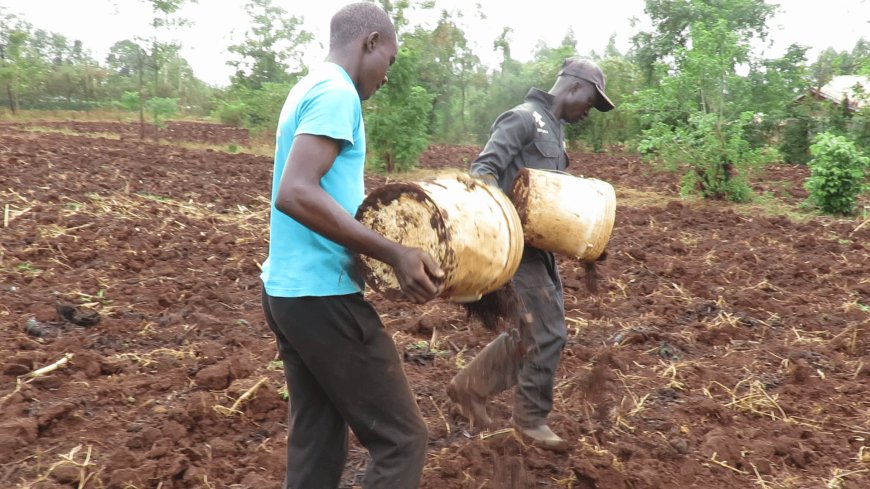Busia farmers Embrace Agro-ecological Farming to cut cost of production

Busia, Friday, April 28, 2023
K.N.A By Absalom Namwalo
With the growing high cost of farm inputs, a section of farmers in Busia County in partnership with Kilimo Hai, an agriculture organisation, have embraced use of organic fertiliser in an effort to transition from conventional farming to Agro-ecological farming practices.
This has become reality through homemade organic manure (from animal waste) and use of rabbit’s urine as pesticides. The farmers believe that organic farming is a reliable means of ensuring sustainable ecosystem management and food security with agricultural production activities that take into account the environmental, social, and economic factors that positively contribute towards sustainable production.
Speaking to KNA during a field visit, Kilimo Hai Field Officer in Busia Michael Wangalwa noted that after adequate training and field demonstrations, many farmers have drastically shifted to practicing Agro-ecological farming due to availability of the materials for making the manure and pesticides.
“Organic fertilizers are less concentrated than synthetic fertilizers and are therefore much safer to use. They are ecological, environmentally friendly and non-toxic in nature, making them the best fertilizers for plants and crops in greenhouse farming. It’s also worth noting that, their regular use does not lead to pollution and contributes to a better future,” said Wangalwa.
His sentiments were echoed by Caleb Musilwa, who reiterated that use of natural fertilizers leads to an augmentation of micro-biologic activity in the soil.
“Organic fertilizers are broken down by organisms in humic acid and amino acid. During this process oxygen is needed and air is drawn, making the soil structure lighter. Due to this combination, a rich, healthy soil with a good biodiversity is created. Because of this, the plant gets enough nutrients and humidity from the soil, resulting in a healthy crop with high resistance against diseases and pests,” noted Musilwa, a Kilimo Hai field officer based in Butula sub-county.
Tabitha Otengo bears testimony of how agroecological farming has boosted her maize production from two 90kg sacks of maize to sixteen 90Kg sacks on sake 1-acre piece of land.
According to Tabitha she has been following training of homemade fertilizer and pesticide from a community radio station before she joined the movement that has since changed her farming method.
She uses fermented liquid organic fertiliser that she produces from organic liquid material acted upon by effective forest microorganisms, such as yeast, fungi, and bacteria which is more sustainable for health plants and high yields.
“In a 10 by 10 composite bit, I mix rabbit urine, fresh cow dung, molasses, activated mountain microorganisms, wood ash, maize/sugarcane grain, and clean water. I cover for some days, then turn it. When it’s ready I use it for planting and top dressing my crops and the nutrients and my maize plants look healthy, I don’t buy industrial fertilizer now,” she noted.
The practice has been embraced by another farmer Benta Otieno from Teso South sub-county who has mastered the art of producing natural pesticide from over 20 rabbits on her farm.
Benta who has been a rabbit farmer for more than four years now and has been taping and using the animals’ urine to control the destructive insects on her maize, groundnuts and banana crops, says she has been able to reduce her expenditure on insecticides to almost nil.
“Farmers can reduce the money they spend on pesticide by using rabbit urine to wipe out whiteflies, sap-sucking insects that attack crops such as vegetables, coffee, macadamia, bananas and avocadoes, among others,” she noted.
Otieno added that, “I started using the urine two years ago on my crops to control different pests and diseases and it has proved very effective on whiteflies.”
According to Kilimo Hai, agro-ecological techniques can improve the resilience of farming systems by increasing diversification through poly-cropping, agroforestry, integrated crop and livestock systems, and the use of local varieties.
“This resilience can reduce the risks of pests and diseases and the costs of seeds. The management of soil fertility through rotations, cover crops and manuring can increase soil water retention or drainage, offer a better response to droughts and floods, reduce the need for irrigation, and help avoid land degradation,” advised Wangalwa.
Courtesy K.N.A
What's Your Reaction?



































































































































































































































































































